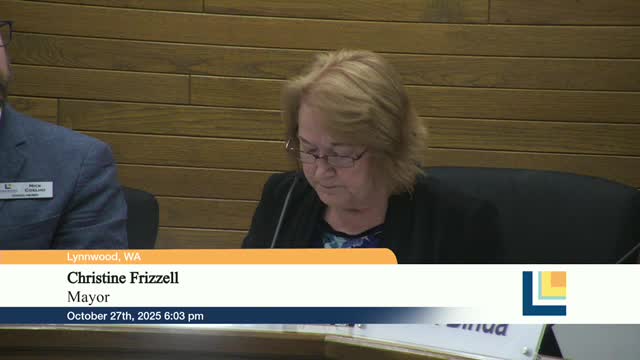Lynnwood residents, council raise privacy and oversight concerns over Flock license-plate readers
Get AI-powered insights, summaries, and transcripts
Subscribe
Summary
Dozens of residents urged the city to remove or audit the Flock automated license-plate reader system, citing privacy, data-sharing with federal agencies, and accuracy concerns; council members said they will review the contract and policies with LPD and legal staff.
Dozens of residents urged the Lynnwood City Council on Oct. 27 to remove or tightly restrict the city's Flock automated license-plate reader (ALPR) cameras, saying the system creates mass location surveillance and can expose residents to federal immigration enforcement.
The mayor read a prepared statement summarizing Lynnwood Police Department uses and results from the system, and several residents said the benefits described by police do not outweigh civil‑liberties and equity harms.
Members of the public testified that ALPR cameras store location data on all drivers, can be searched across jurisdictions, and have been used in other places by federal immigration authorities and other agencies without local oversight. "These cameras record the movement of every driver all the time," said Xavier Rodriguez, who asked the council to decline adoption unless the city requires strict data‑retention limits and independent audits. Elena King said long‑term tracking "functions as warrantless mass surveillance" and urged the council to require stronger civil‑rights protections.
Other speakers raised technical and legal concerns. Steven DuBois, an IT professional, said that because a private vendor hosts ALPR data in the cloud, the city lacks practical control over it. Several commenters, including Quinn Van Orter and Dimitri James, cited a University of Washington report and a UW Center for Human Rights analysis alleging avenues for federal access and side‑door searches; Isabel Mata asked the council to amend the contract so data be deleted within three minutes.
Council members responded that they take the concerns seriously. Councilmember Bridal said she strongly opposes the cameras and called for their removal. Councilmember Coelho said leadership is reviewing the issue with legal counsel and LPD. Councilmember Hurst said staff should reexamine the contract and data security, noting that cloud hosting can mean loss of control over data. Councilmember Lutweiler and others said the city will review agency access lists, the vendor agreement and transparency materials.
No formal policy change or vote occurred at the meeting. Council members said they would pursue further review with the police department and the city attorney and return with additional information and recommendations.
Why it matters: ALPR systems collect vehicle‑movement data on broad populations, which civil‑liberties groups and some residents say can chill public life, disproportionately affect vulnerable communities and be repurposed when shared beyond local control. City leaders signaled further review rather than immediate action.
What happens next: Council members said leadership will schedule follow‑up briefings with legal counsel and LPD; members asked staff to provide an update to the council leadership in the coming week.
